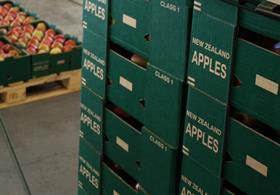
Apples Futures, the NZ$2.7m (€1.5m) research partnership between the New Zealand topfruit industry and three regional development agencies in Hawke’s Bay, Nelson and Otago aimed at meeting demand for safe, high-quality fresh fruit, has reached the end of its three-year remit having apparently achieved strong results and produced a proven, viable production management system for the country's apple and pear growers.
According to industry body Pipfruit NZ, the three-year project not only achieved, but exceeded, all of the performance milestones it was set at the start of the 2007/08 season.
Since its inception, more than two-thirds of apple growers in New Zealand have joined the programme, producing good-quality, export-grade fruit with residue levels at less than 10 per cent of the Maximum Residue Levels (MRLs) allowed in EU markets, Pipfruit NZ said revealed in a statement.
The programme has been severely tested over the three years, successfully managing periods of high pest and disease pressure, the group added.
As a result, the industry has reportedly gained confidence that the model developed by Apple Futures is sufficiently robust to meet future challenges.
'Significantly, it has also enabled the New Zealand apple and pear industries to move further ahead of competitors in the drive to produce safe food, providing a solid foundation to build future chapters of the New Zealand Apple Story,' said Peter Beaven, chief executive of Pipfruit NZ and a director of Apple Futures.
He also insisited that, as a result of the project, New Zealand now produces 'the safest apples and pears on the planet'.
Project manager John Austin-Smith attributed much of the project's success to the strength of its technical advisors, arguing that the involvement of experts from Plant & Food Research and Pipfruit NZ had been crucial.
'They have developed and refined the programme continuously, and worked with growers, advisors and consultants to ensure the project has benefited from the expertise of the total industry,' he said.
As a spin-off from the project, the New Zealand topfruit industry has also launched a collaborative marketing programme aimed at telling the New Zealand Apple Story in overseas markets.
A new website www.produceofnewzealand.org has been developed as the platform for the programme, and the industry has developed a country of origin mark – 100% Pure Apples from New Zealand – to build on the image New Zealand is developing in those export markets.
The importance of the Apple Futures project to the New Zealand apple industry was clear, Mr Beaven added.
'European Supermarkets want to provide their customers with safe food, which for the apple industry means that fruit supplied to them must be grown without the use of harsh chemicals still in use in many countries, and with very low levels of residues from the limited range of sprays that regulators now allow to manage disease and pest pressure,' he said.






No comments yet